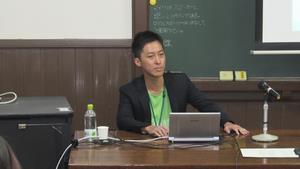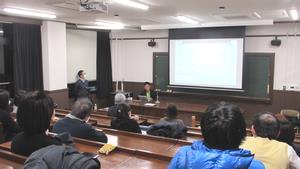- Global Collaboration Center
- Activity
- Report on 26th SDGs (Sustainable Development Goals) Seminar "Do Crickets Save the Planet? Well-Being for the Earth and Life - Creating a Sustainable Food Future with Crickets" (Jan. 2023)
ページの本文です。
Report on 26th SDGs (Sustainable Development Goals) Seminar "Do Crickets Save the Planet? Well-Being for the Earth and Life - Creating a Sustainable Food Future with Crickets" (Jan. 2023)
2023年5月1日更新
On January 30, 2023, Mr. Seiya Asikari, representative director of Ecologgie, Inc. was invited to make a presentation at the 26th SDGs Seminar, "Can Crickets Save the Planet? Well-Being for the Earth and Life - Creating a Sustainable Food Future with Crickets." Mr. Asikari founded Ecologgie Inc. in 2017 while he was a student at the Graduate School of Advanced Science and Engineering, Waseda University, and moved to Cambodia in 2019 to establish a cricket research and mass production system. He was selected as one of the "Forbes 30 Under 30 Japan" in the same year, and currently divides his time between Cambodia and Japan, simultaneously strengthening the research and production base system in Cambodia and overseeing measures to strengthen branding and increase awareness in Japan. He talked about the appeal of crickets as an entomophagous food, his motivation for founding the company, and his business in Cambodia.
Amid fears of a food crisis due to population growth, insect diets are attracting attention as an eco-friendly alternative protein with low environmental impact. Crickets as an insect food are characterized by their high-quality protein source, low CO2 emissions, and high production efficiency. Mr. Asikari saw the potential of crickets when he was a university student and began raising crickets, first at home and then, as his production scale increased, in rented space in Japan. The low winter temperatures in Japan limited his ability to increase the number of crickets, so he sought a warmer location and chose Cambodia. In Cambodia, insects are eaten on a daily basis, there are cricket statues in the streets, and crickets are raised as a side business by farmers. There is an ideal environment for cricket breeding.
Cricket farming in Cambodia uses food waste from food factories as cricket feed, and local farmers buy the crickets they raise as a side business. Crickets take just 45 days to become a commercial product, providing eight opportunities for cash income per year. In fact, the farmers Mr. Asikari works with say their incomes have increased since they started raising crickets, and they have seen changes such as their children being able to attend school continuously. Currently, he is mainly expanding his business to other ASEAN countries and working to improve the nutrition of pregnant women in Cambodia, where hospital food is not part of the culture. I was very much fascinated by the business model that not only solves the food crisis, but also contributes to local social issues such as food loss, income disparity, and nutritional status.
In Japan, where resistance to entomophagy is strong, attempts are being made to lower the barriers to eating insects by selling products containing powdered insects mixed with sweets. However, it is not yet become widespread enough to be incorporated into the diet as an alternative protein, and it is believed that if this trend continues, it will be a temporary boom. There are still challenges to be overcome before entomophagy becomes an option in the daily diet.
I am interested in social entrepreneurship as a way to contribute to social issues. I believe that by providing "goods" and "services" that meet the needs of the market, we can make a sustainable social contribution that builds a better society while circulating money. How do you build trust and go where no one has gone before? It was extremely valuable for us to hear directly from Mr. Asikari, a social entrepreneur, about his philosophy and his difficult journey.
(Amelie Rippel, freshman student, Department of Human and Social Sciences, Faculty of Letters and Education)
【related link】
※Vision | ecologgie Inc.












